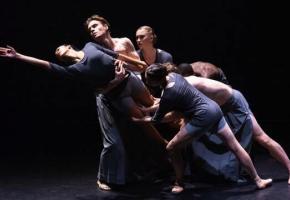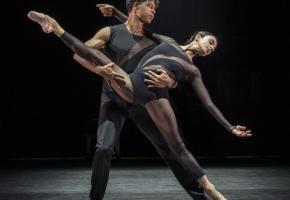The first time I saw Carlos Acosta, was across a steamy dance floor in a grotty West End salsa cellar, where sub-standard dancers were throwing off the shackles of their daily grind. He was huddled inconspicuously amidst a pack of Cuban males - always a lively site; their un-pc banter evident in exaggerated gesticulations of camaderie.
And then, as he took to the dance floor, the revelation. It was as if time stopped and everything around him (including his dance partner) became a blur. From being just another member of the (not always most gracious) London Cuban clan, this rough macho morphosed into a different, more divine, species altogether; blending elegance and strength, lyricism and control, street swagger and finesse.
You can hardly get two more polarised styles than the flat-footed flare of Cuban salsa, and the high-headed grace and precision of ballet and yet here they collided in a unique vision of perfect symmetry, of absolute proportion.
These juxtapositions are the qualities ballet critics have always raved about - along with his incredible leaps - when it comes to the Carlos Acosta of the ballet stage, whether the Royal Opera House, the Bolshoi, Paris Opera. My Acosta experience, however, was not the Cuban street kid in the ballet, rather than the ballet in the Cuban - yet can you imagine a Mikhail Baryshnikov or a Rudolf Nureyef getting fresh and funky amongst the sweaty hoi-palloi of an urban nightclub?
Sitting opposite me 11 years later, now a global superstar, at the pinnacle of a glorious career, Carlos cringes as I remind him of his dark past in London’s salsa underworld, and some of the company he kept. You were a newcomer to London then. What was going on in his life?
“You know, in my 13 years in London there have been highs and lows. I was 25 when I arrived, after spending five years at the Houston Ballet, so I was approaching my prime years, but the situation at the Royal Ballet wasn’t very favourable for me at the time. The Opera House was in refurbishment, and because we had no venue and they weren’t putting on a lot of shows, there just wasn’t enough work to go around for the Principal dancers. So actually I was pretty depressed back then, I’d just split up with the girlfriend I’d had in the US, I was alone and not dancing much, and was kind of questioning whether I’d made the right decision by coming here.”
Ah so that’s why you were spending all your time in the Salsa Clubs, forgetting your sorrows?
"Uhh yeah," he laughs coyly.

It wasn’t long before things really took off for Carlos, however.
“When the Opera house opened again, I actually found myself in a position of real opportunity, because a lot of dancers had left so in a way, although I didn’t see it, those years in which I felt a bit lost ended up being good for me. I started getting the big roles and could show what I was capable of.”
Within years, Carlos was not only to become the star dancer in one of the world's major ballets, but to have the most successful international career of his generation; he’s been invited as guest dancer in the wolrds greatest ballets - the Bolshoi, the Paris Opera, the Royal - in the same year for three consequetive years. Then to launch his extremely successful own production - Tocororo - as choreographer.
Carlos now raves about London, in many ways the launch-pad of his success. How did you adapt to it?
At first it was really tough, because London is a huge metropolis, there are so many people, so many things going on, so much competition in terms of events and productions, that its kind of difficult to find your place. It’s takes a while to understand how things and the people work here, And then of course there’s the weather….us Latinos find this tough… but once you get used to things, and work with the system rather than fight it, you start to see the huge benefits and things start to open up. This is a great great city, the variety of shows on offer, from theatre , music and dance, is unparallelled, What doesn’t start here, always comes though here…it is like a one stop shop of ideas and cultural productions.
And Londoners?
I have to say, especially on a professional level, the treatment I’ve had has been beyond reproach. I’ve grown to really appreciate the diplomacy of the English and also the space they give you, for your privacy and also to develop your creativity. Many foreigners here see this as coldness but I've grown to see it as respect. I also appreciate their openness, how people embrace other cultures, they are interested new things…
As he raves about English diplomacy, I cannot help think of another incident ‘back in the day’ that rather conflicts with this rosy image of Englishness. We had arranged to meet for a drink in a bar called Little Italy in Soho and I arrived, slightly late, to find Carlos sitting outside the café next door, Bar Italia. When I asked him why he was siting outside he said that he’d been denied entry by the bouncer. Was it Carlos' accent (pretty thick back then)? those flamboyant Cuban mannerisms? The big man in the suit refused to even look at him, never mind give an explanation, when we asked for one. Later, friends told me that that place was notoriously racist. Carlos didn't want to push it and made a joke that the night before, at a gala event at the Royal Albert Hall, he had had a fumbling, bumbling Prince Charles going overboard to make conversation with him, that he had to resort to the subject of Cuban agriculture….
"Yeah, and the next day..." Carlos remembers, "this....comemierda….” we laugh at that funniest of cubanisms (or 'comemielda' to be precise). But this interlude has not blighted Carlos' fondness for the English. ‘Comemierdas, hay in todas partes’ we agree.
But in general, I insist, compared to the US, the English are often seen as being quite closed and conservative…
“I’ve never found that. I mean especially with regards to the Royal Ballet…in Paris all the principal dancers are French, in the Bolshoi, they are all Russian, here practically all the principal dancers are foreign, I think of 20 only 2 are English. The Royal Ballet is the most open in the world I think. And it’s a reflection of the city’s cultural attitude; I think because it has assimilated so many different cultures. In London, you can have yellow hair, green hair and people will shake your hand and say ‘how do you do’ as if you were the most normal looking person. Part of that is diplomacy, but part of it is just acceptance. Ballet is a traditional environment because it is full of classical roles made with white people in mind. It's the obvious excuse to discriminate. And I have I’ve seen with my own eyes how they do this in other countries, how they don't give the major roles to deserving black dancers in the companies. But at the Royal Ballet I’ve never felt limited or held back because of my colour. I have been given all the major classical ballet roles”
Carlos is at a level of stardom now where not even the Bolshoi could afford to exercise prejudice, if it felt so inclined. The 'English experience’ that Carlos claims helped get him to that place started in Houston, of all places, with the British ballet dancer Ben Stevenson, who was then the director of the Houston Ballet. It was this encounter, Carlos says, that secured his footing on the path to stardom, and he feels indebted to him.
“When I was approaching my prime years as a dancer at Houston, Ben threw all the big roles at me. He always had faith in me and pushed me. He allowed me to grow as a dancer and most importantly, he gave me confidence. Those early years are crucial in terms of your confidence because if you don’t get the big roles you start doubting yourself and thinking there’s something wrong with you and you’re not that good, and then this has a knock on effect on yours dancing. I’ve seen this in the US, that black dancers are often not given the roles they deserve, the roles they need to become superstars. Already when I came to London, I had this confidence and the expectations of myself, so by that time I wouldn’t have let anyone stop me. But If I hadn’t been there with Ben, I might not have got that confidence.”

Perhaps it is this confidence that has allowed Carlos to venture into and succeed in a new career as choreographer. His semi-autobiographical show Tocororo – A Cuban Tale, mixing classical ballet and Cuban dance was a huge success at the box office, “the highlight of my career” he says.
When Carlos talks about his achievements, he is not afraid to be proud. Yet this (not-so-English) assertiveness is balanced by the self-deprecating habit (a common English one) of crediting success to a confluence of elements over talent, including external support, hard work and also a large dose of luck.
“I’ve been very, very lucky. I’ve always had people who’ve believed in me and pushed me to my maximum ability. It also had to do with the fact that I started so young. I was only 20 by the time I arrivbed in Houston and had already been dancing internationally by then.”
Lastly Carlos does not discount the Cuban element. Not only is it a place where great emphasis is placed on creativity and one of the few Latin American countries where Afro-Latin culture is clebrated and where colour is not a stumbling block (at least less of one), but it happns to be home to one of the world’s most highly regarded Ballet schools, The Cuban National Ballet, created by Fernando and Alicia Alonso.
“In 1948 they embarked on an educational programme, going all around the country, throuhgh the country side, setting up schools, Most importantly they implemented one sole method of ballet, which has become a solid matrix. Cuba is now the only country in the Americas that has its own method, like the Russian or the French. and now I think you can say that Cuban dancers are as prominent in the world of ballet today as the Russians were in the 1960s. People from all around the world go to study ballet in Cuba.”
How do you feel about Cuba now?
“I understand the criticisms people have. Cuba has to change. Young people want to do things there and they feel very frustrated, and dancers are leaving. But it is already changing... Raúl Castro is already making changes. At the same time, I am Cuban, and proud of being Cuban and nothing will change that. I spend as much time as I can there. I personally have never had any problems with the government. They have never restricted me in my career, never tried to influence or manipulate me. But I can only speak for myself.”

Whatever the battles of the past, the reality is that Carlos has the world at his feet. Those feet, he admits are itching for something else. Having just completed another season of Swan Lake at the Royal Ballet, he laughs and rolls his eyes: “Si tengo que besar otro cisne…” reverting to Spanish in case the ballet heresy might get out.
As if hearing the cue, he gets a call and wanders off to talk on his mobile. "That was my manager," he says on his return.“They want to fly me to LA to be a guest on ‘Dancing with the Stars’.” He pauses. “30 Million viewers.”
Then out of the blue, in Spanish, he asks. “What do you think?”
“Of course you should do it!” is my instinctive response. “You have a duty to do it... How many black dancers have reached your level?”
"None," he replies.
“Think about what a role model that makes you. Plus you are Cuban. The Americans didn’t produce the first black global ballet superstar, Cuba did. You are a myth buster. So you need to be a household name. It will make you a household name.”
He listens intently. And I suddenly think about how we have weaved through this interview in and out of two languages, completely unconsciously, and how you can be different people in different languages. In English, Carlos has developed a distinguished and super-confident persona. In Spanish, I still see the vulnerability of the young Cuban that I first met, with something to prove.
Then he says something, with a mischievous smile, in English, that is SO English…
“Because you know, it's downhill from here.” I laugh so much. That is definitely not the kind of self-effacing admission your average proud Cuban male would make. “Well, it’s true!” he chuckles with me. “I have to think about my future.”
I reckon it takes someone that is really sure about himself to make a joke like that. That boy I knew on the salsa scene, has definitely grown up. He asks me if I am still dancing salsa. I say not…children, writing, life with meaning and all that…and he says he doesn’t either…swans, TV contracts, a novel...you move on...we agree...but there's nothing like a good rumba once in a while.
I remember once Carlos saying he danced salsa to relax after hours of ballet training. Most Londoners take up salsa TO exercise, so it can hardly be called the same activity. But I still think, the greatest artists of all time, Mozart, Francis Bacon were never afraid of rollicking with ordinary folk, however lofty their art, and they knew how to rumba with the best of them. They were who they were, whether in the company of royalty or the great unwashed. They saw their art as being part of the people, accessible, not reserved for the chattering classes. If my advice he asks for is worth anything, Carlos Acosta is charmed, and he knows show to behave with it. He’s gonna be alright on the night, even on the glitteringly banale plastic stage of American mass viewing.

















